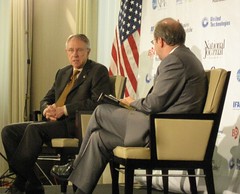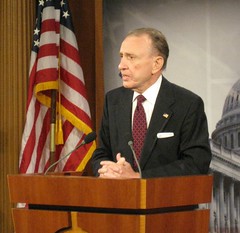Wednesday
Dec302009
Bureau Chief Ellen Ratner Gives Her Predictions For 2010
We are beginning the second decade of the millennium. We'll see congressional elections, the winter Olympics and a few Republican candidates beginning the Iowa and New Hampshire slog toward the nomination for president. Some of the year is highly predictable, while the wild card of the weeks and days will bring entertainment, sadness and joy as we move through the next 365 days. So, without the benefit of a crystal ball or being able to discern the stars, here is what I predict.
1. Health care passes the House and Senate within a week of the State of the Union address. The plan might be to get it done before the State of the Union, but it will be passed within a week in either direction of the congressional speech. The president's address will be used as the rallying cry.
2. The November midterm elections will have the Democrats losing a maximum of 23 seats in the House, but not more. They will lose three seats in the Senate. This loss will prompt the Republicans to once again see this as a mandate and move to the conservative wing of the party. Unless Newt Gingrich rises to the top as the potential nominee, the party will begin to support right-wing candidates who do nothing except increase President Obama's chance for re-election.
3. We discover more water on other planets and even see the precursors for life on some of these. The possible discovery of water on the moon and Mars has increased the chances of sustainable life in many far away lands. "That we are not alone" is becoming more and more of a reality. Not exactly the bar scene from "Star Wars," but on a microbe level we are not the only actors.
4. We impose sanctions on Iran. I do not need to be a soothsayer to predict this, but all indications lead to imposing sanctions. The trouble is that without the help of some of the Arab countries that trade with Iran such as UAE, there is not much help that sanctions could work.
5. After the sanctions are imposed, there will be a significant, internal change in Iran, which will make the Obama idea of possible communication a reality – although the neo-cons will be furious.
6. Consuming less and giving more becomes the consequence of the poor economy. As Americans have less and reassess their values, blatant consumerism will reduce. Charitable giving will increase among middle-class donors.
7. Americans will become more aware of the drug trade from Mexico. It has been something that has been lost in the immigration debate. Mexico as a "failed state" will become more of a headline.
8. Afghanistan will calm down, and it will look like Gen. Stanley McChrystal's plan is working. The Taliban will be waiting for its moment and will wait us out. We will declare victory and with the exception of few headlines down the line when the Taliban and the warlords take back their territory. By that time America is on to new concerns and does not even register a blip.
9. Meg Whitman wins the race for governor of California. Former Gov. Brown and San Francisco Mayor Newsom don't make the final cut with the people of California.
10. Prevention in health becomes the buzzword. The insurance lobby, freaking out that it can't drop subscribers, turns to the only thing it knows works: getting Americans healthier. It works with governors and states to help fund tobacco prevention and healthy diet programs.
11. Unusual state taxes get voted on. California will tax medical marijuana, and other states find ways to tax Internet purchases and develop sin taxes.
So there you have it readers. I invite you to send me yours, and we will look at my track record in a year! Have a wonderful New Year and may God bless you and your family.
1. Health care passes the House and Senate within a week of the State of the Union address. The plan might be to get it done before the State of the Union, but it will be passed within a week in either direction of the congressional speech. The president's address will be used as the rallying cry.
2. The November midterm elections will have the Democrats losing a maximum of 23 seats in the House, but not more. They will lose three seats in the Senate. This loss will prompt the Republicans to once again see this as a mandate and move to the conservative wing of the party. Unless Newt Gingrich rises to the top as the potential nominee, the party will begin to support right-wing candidates who do nothing except increase President Obama's chance for re-election.
3. We discover more water on other planets and even see the precursors for life on some of these. The possible discovery of water on the moon and Mars has increased the chances of sustainable life in many far away lands. "That we are not alone" is becoming more and more of a reality. Not exactly the bar scene from "Star Wars," but on a microbe level we are not the only actors.
4. We impose sanctions on Iran. I do not need to be a soothsayer to predict this, but all indications lead to imposing sanctions. The trouble is that without the help of some of the Arab countries that trade with Iran such as UAE, there is not much help that sanctions could work.
5. After the sanctions are imposed, there will be a significant, internal change in Iran, which will make the Obama idea of possible communication a reality – although the neo-cons will be furious.
6. Consuming less and giving more becomes the consequence of the poor economy. As Americans have less and reassess their values, blatant consumerism will reduce. Charitable giving will increase among middle-class donors.
7. Americans will become more aware of the drug trade from Mexico. It has been something that has been lost in the immigration debate. Mexico as a "failed state" will become more of a headline.
8. Afghanistan will calm down, and it will look like Gen. Stanley McChrystal's plan is working. The Taliban will be waiting for its moment and will wait us out. We will declare victory and with the exception of few headlines down the line when the Taliban and the warlords take back their territory. By that time America is on to new concerns and does not even register a blip.
9. Meg Whitman wins the race for governor of California. Former Gov. Brown and San Francisco Mayor Newsom don't make the final cut with the people of California.
10. Prevention in health becomes the buzzword. The insurance lobby, freaking out that it can't drop subscribers, turns to the only thing it knows works: getting Americans healthier. It works with governors and states to help fund tobacco prevention and healthy diet programs.
11. Unusual state taxes get voted on. California will tax medical marijuana, and other states find ways to tax Internet purchases and develop sin taxes.
So there you have it readers. I invite you to send me yours, and we will look at my track record in a year! Have a wonderful New Year and may God bless you and your family.
tagged  2010,
2010,  2010 predictions,
2010 predictions,  Ellen Ratner in
Ellen Ratner in  Opinion
Opinion
 2010,
2010,  2010 predictions,
2010 predictions,  Ellen Ratner in
Ellen Ratner in  Opinion
Opinion 







Democrats Entering 2010 Races Strong, Says Sen. Menendez
"We are still fourteen months away from an election...and that's an eternity," Menendez said in a pen and pad session with reporters.
However, Menendez believes that Democrats are still better positioned for the long-term, noting that Republicans have done nothing to put the U.S. in better economic shape. According to him, health care reform is a strong asset for Democrats because Republicans' strategy is for the elimination of the public option.
"Republican strategy is short-sided...they have forfeited the two biggest issues: the economy and health care," Menendez said.